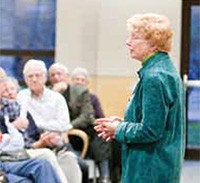
Mary Jo Bane, academic dean at Harvard University’s John F. Kennedy School of Government, spoke at the School on November 12. Bane is also the Thornton Bradshaw Professor of Public Policy and Management, as well as chair of the Management and Leadership area at Harvard’s School of Government.
Bane focused on three concepts: the poverty of poor places, the poverty of bad patches, and the poverty of chronic conditions.
“Poor places” are areas with a lack of economic development. Studies show a tight relationship between measures of poverty and GDP per capita.
“Bad patches” is what Bane calls temporary periods of hard economic times. Some factors that precipitate short-term poverty are droughts and floods; the laying off of industrial employees; and death, accident, or sickness of the breadwinner. Short-term poverty is widespread and short-lived. Two-thirds of the poor are poor for fewer than two years, a study in the United States shows, and more than half of Americans are expected to have shortterm poverty at least once in their lifetime.
As assistant secretary for children and families, U.S. Department of Health and Human Services, in the Clinton Administration and commissioner of the New York State Department of Social Services, Bane sought to further safety nets through U.S. government policy. She has learned that different policy designs—from food stamps and Social Security to unemployment compensation and health insurance—are required for different unanticipated consequences for different groups.
Those who fall into the final type of poverty— chronic poverty that occurs in rich- or middle-income countries—are poor as a result of a variety of difficult circumstances and make up a small proportion of the poor. Chronic poverty is harder to deal with than short-term poverty, Bane said, calling for such solutions as education and small- to medium-sized businesses that create jobs.
Bane’s lecture was sponsored by the School of Social Work, the Gerald R. Ford School of Public Policy, the St. Mary Student Parish, and the U-M National Poverty Center.
—Tanya C. Hart Emley is editor of Ongoing.